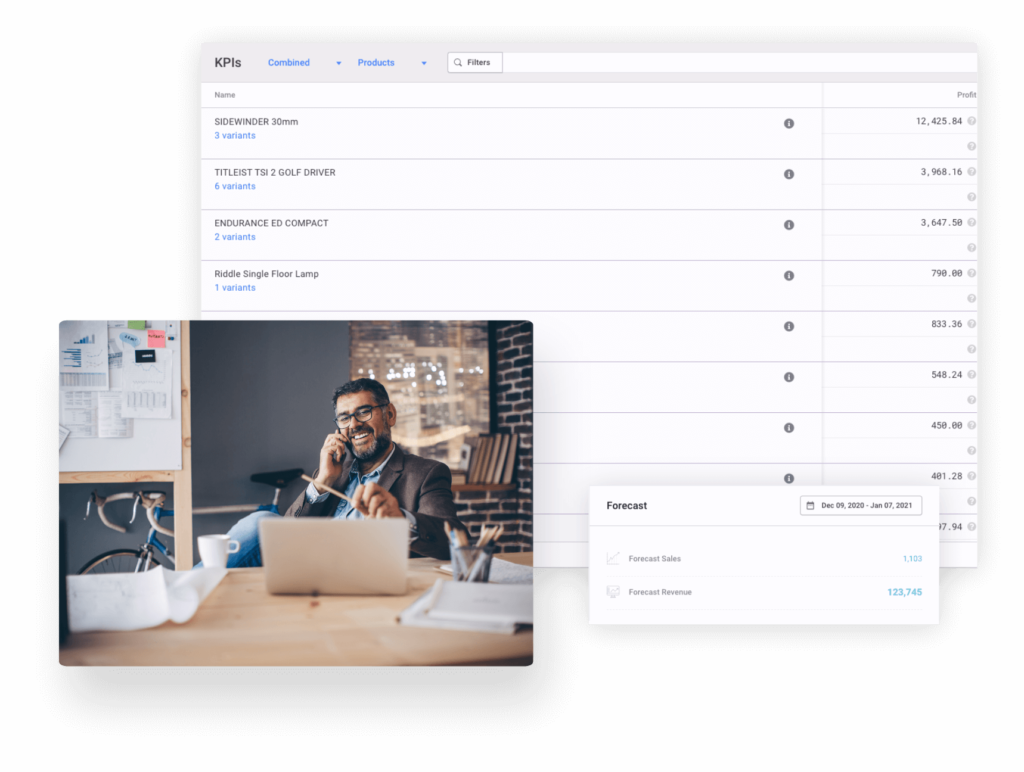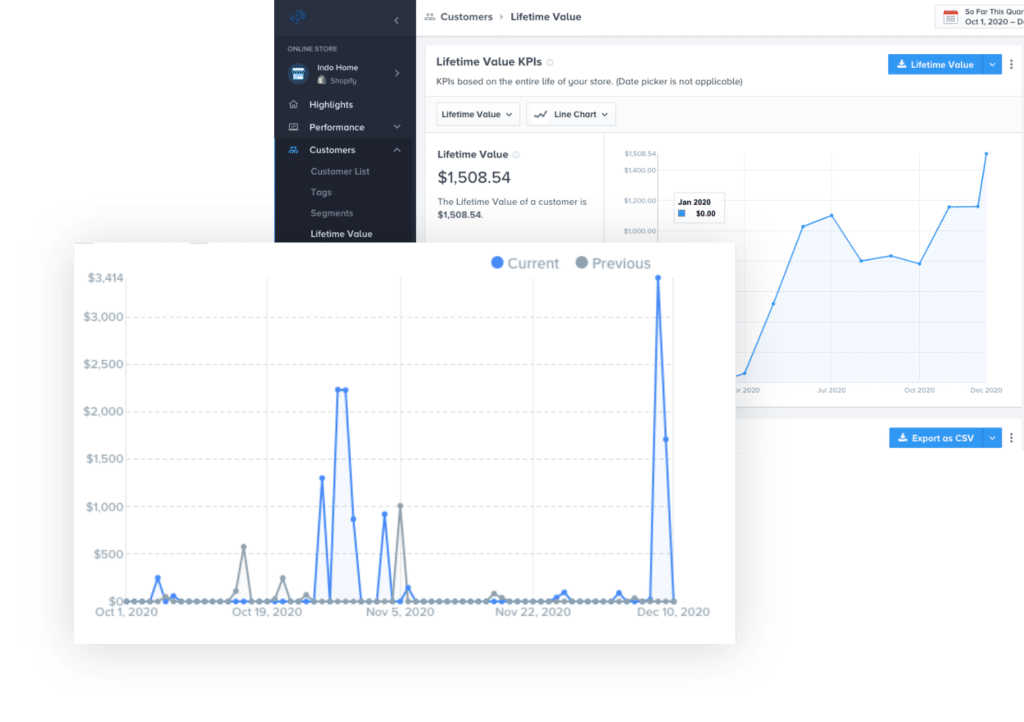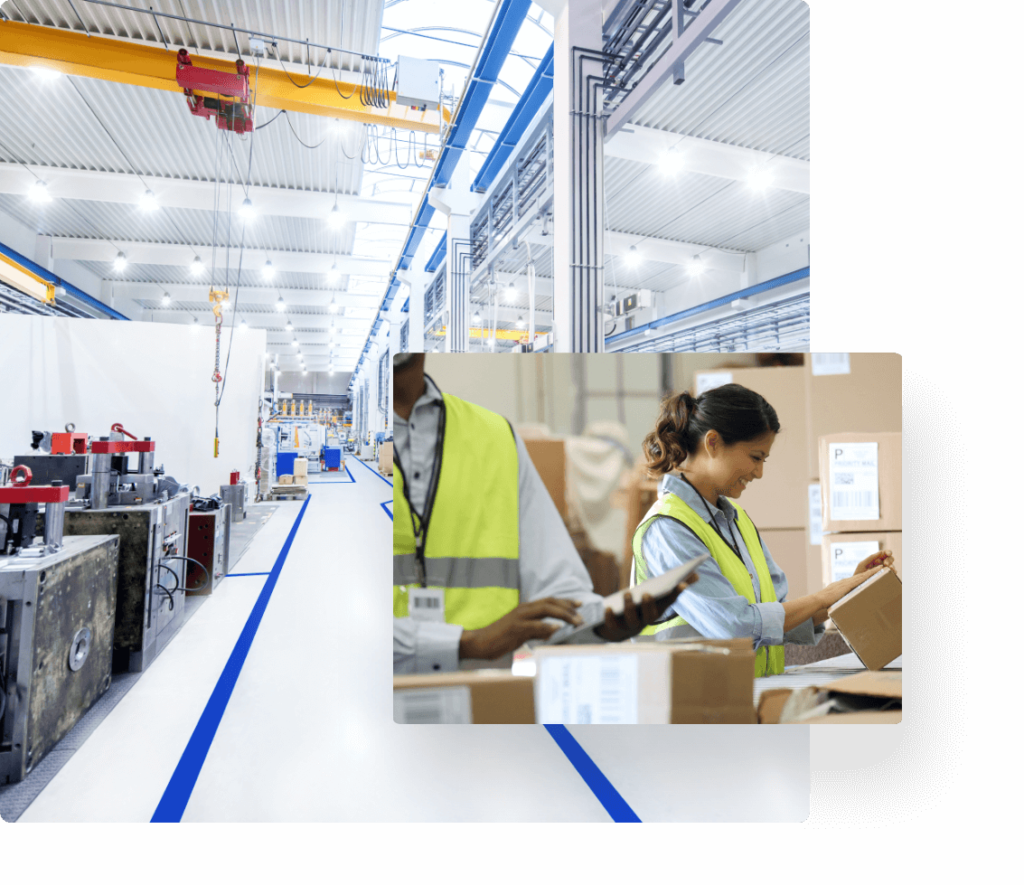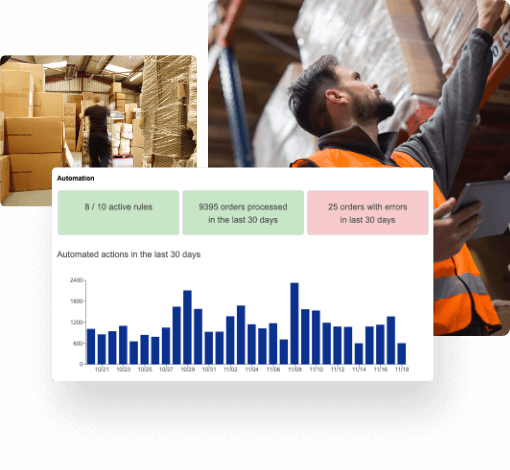In this post, we’ll explore the most efficient and flexible systems to streamline and automate post-purchase ecommerce operations in your Shopify stores, whether they are ERP systems or other alternatives that are suitable for ecommerce businesses.
What is an ERP?
An ERP solution (Enterprise Resource Planning) is a complete, integrated platform that allows you to run your entire business from finance, manufacturing, supply chain, procurement, HR and more. ERP integrates these processes into a single system. ERP systems are known for being comprehensive, and can work across different industries. Keep in mind, this one-size-fits-all approach may not be the most suitable and cost-effective for ecommerce or omnichannel businesses.
On the flip side though, an ERP system could take months or even years to be implemented and customized to fit your business needs, which is overwhelming and costly. Due to the complexity of implementing an ERP system, its’ implementation failure rate is high – according to Gartner, 55% to 75% of ERP projects fail to meet their objectives.
Fortunately, there are comprehensive solutions more tailored to ecommerce and omnichannel businesses. These work like an ERP but without long and complex implementation nor all the customization required.
Brightpearl’s software transitions away from traditional one-size-fits-all ERP systems towards the flexible and scalable alternative of an operating system that is tailored to ecommerce and omnichannel businesses. Given that many online merchants don’t require all the functionality provided by ERP software, like manufacturing, HR, procurement, a system with tools specifically tailored to meet your needs is a great way to start.
Indeed, Brightpearl’s system has been built solely for omnichannel retailers and wholesalers. It doesn’t require endless and pricey customizations and can grow with your business. The Brightpearl team also scope the project before the contract is signed, ensuring all your requirements can be met by the system and there won’t be any nasty surprises down the road. This comprehensive, in-house implementation will make sure that the system is properly implemented and your data is migrated in the most efficient way.
What is an ERP for Shopify, and why do you need one?
As your business grows, you’ll need to embrace new technology to maintain efficiency. For many Shopify users, this means adopting a solution that works as an ERP to manage post-purchase operations.

Legacy one-size-fits-all ERP solutions require tons of coding and customizations just to be able to connect to different sales channels, including Shopify. Brightpearl’s retail operating system, with its seamless integration with Shopify, is a better solution.
It allows you to add on and automate the following tools and processes to suit your business model:
- Inventory
- Order management
- Warehousing
- Fulfillment
- Shipment, returns, and refunds
- Financial management
- Purchasing
- Workflow automation
- POS (Point of Sales)
- CRM (Customer Relationship Management)
- Retail business intelligence
Meets growing operational complexity
Business activities change as your business expands. Your operational complexity will grow with the size of your business. Order processing, shipping, fulfillment, and inventory all evolve with you.
If you sell on different channels and each channel requires its own fulfillment method, you may have multiple warehouses or dropshippers. You might also operate in the retail and wholesale spheres. You need a robust system that can handle all of these operations in a streamlined way. An integrated platform allows you to do this all in one place.
Opens the door to more fulfillment options
Retailers aim for maximum customer satisfaction. That means quick, accurate deliveries to the customer. When orders start to mount, fulfillment can become complex, especially if you have warehouses in multiple locations or send products with dropshipping.
Ensure you’re meeting demand with a Shopify ERP or a retail operating system that can automate complex order fulfillment workflows. You can see an audit log of supplier stock levels and get real-time accounting updates. This is ideal if you operate on a partial fulfillment or click and collect basis too.
Makes the inventory management process a breeze
Inventory management can become a challenging task when operating on a large scale or on multiple sales channels. For example, if you have a brick-and-mortar and online store, you need to make sure all of your existing products are synced across the board in real-time.
Ecommerce integrations play an important role here. When integrations are pre-built without a third-party standing in the middle, inventory and order data are synced in a more seamless way. Like Brightpearl’s integration with Shopify. It’s built, managed and supported in-house and can handle large order volumes.
Provides real-time information and analytics
Every business owner needs to be aware of what’s happening on the ground. Using a system that provides real-time information and analytics is crucial. You can maximize your profit margins and make your business’s performance more visible and accessible. You can monitor and analyze business information to establish the areas you’re excelling in and those that need improvement. This can enable you to make critical business decisions affecting the whole organization more easily.

Enhances the customer experience
At the heart of every business is the customer. They expect an excellent experience. Typically this means providing easy-to-navigate websites, simple payment processes (such as Sage), quick delivery, hassle-free returns, great products and the ability to buy wherever and whenever they want. So you need a system that can seamlessly integrate to all the sales channels and the best-in-breed softwares for different needs such as payment, carriers, BOPIS etc.
What’s more, customer data is critical to improve customer satisfaction. With key insights on customer buying behaviour and communication preferences, you can improve your product mix and channel strategies to better meet their needs.
Scale your retail business
Keeping a retail business scalable is key. Using the right platforms to support your growth is even more crucial. One-size-fits-all ERP like SAP Business One, Microsoft Dynamics NAV, Oracle Netsuite, and Acumatica are often rigid and can take months or years to develop necessary customizations to meet your growth needs.
On the other hand, retail operating systems like Brightpearl have all the core functionality and purpose-built integrations in place to meet omnichannel businesses’ needs. And with deep API capability, you can extend your technology stack to meet your business expansion. Also once your business takes off and scales, you’ll need to handle higher order volumes. So your system shouldn’t hold you back.
What to look for in an ERP for Shopify stores
You should consider looking for the following features when choosing ERP software for your business:
Seamless integration to your store
Reliable, native integration with Shopify is critical because it usually works more smoothly and you can avoid potential issues when using third parties to provide connectivity, which, typically, do not provide direct support.
Traditional one-size-fits-all ERP systems usually don’t include pre-built Shopify integrations and adding this means extra cost and time spent. This is typically carried out through a reseller or 3rd party partner. This makes it difficult to control the quality of the integration and it may take time to fix bugs since there is no access to direct support.
So, if you want your back office system to work seamlessly with your Shopify store, you need to make sure the native ecommerce integrations are covered by the ERP system and they perform as expected. Otherwise, a retail-tailored operating system like Brightpearl might be a better option.
Flexibility
Flexibility is a critical feature for Shopify merchants, given that the ecommerce world is ever-evolving and retailers need to keep up to meet customer demand.
It’s crucial to make sure that the system is scalable and doesn’t require complex customizations when expanding to a new sales channel or adopting a new business model like DTC. So, select a system that is flexible and has an easy to access support system.
Flexible Order fulfillment and inventory management functions
When looking for an ERP for Shopify stores, you must choose a system that can handle multi-location inventory, complex fulfillment, such as dropshipping (even with Amazon), and partial fulfillment
Nowadays, businesses don’t just operate from one base. They have many offices and warehouses located across the globe. It’s essential that the system you choose can keep up with this and includes sophisticated inventory management functions to keep everything running as smoothly as possible.

Ecommerce operations automation
Merchants need to save time on monotonous manual tasks such as Shopify order processing, shipping, fulfillment, and invoicing. Automating many time-consuming workflows can help. You need an intuitive work tool to be integrated into your retail processing solution that doesn’t need to be configured or coded.
Brightpearl helps to automate ecommerce processes. You can set conditions for sale, e.g., only send out products that have already been paid for. You can also set base actions such as allocating stock and updating order status. There are even advanced options such as instantly re-routing orders to alternative warehouses when stock isn’t available.
The cost
Be sure to check the cost of your Shopify ERP. There can often be hidden fees that go unnoticed before signing the contract. Here are some of the key components in planning the cost of ERP:
- Software licensing fees
- Network hardware
- Support/customer care line
- Data conversion and transfer to new ERP
- Additional servers
- Customization with add-ons
- Testing
- Training
Unlike most of the ERP systems, Brightpearl scopes customers’ projects before they sign, so there won’t be any hidden costs. This also means that the team can be sure the solution meets your needs.
Easy to use and navigate
Many employees may access the same ERP system at various levels within the company. Therefore, it must be universally easy to use and navigate. Coding and re-engineering an ERP is risky, costly, and time-consuming.
Shopify merchants should opt for a configurable (no-coding or developer needed) system rather than a customizable one, where potential coding may be required.
Why Merchants Choose Brightpearl as a Shopify ERP alternative
Brightpearl is a trustworthy partner of Shopify. Shopify even uses this solution to manage the inventory and ordering of their hardware! This partnership enables businesses to buy Shopify’s point-of-sale hardware products online seamlessly.
So, with Shopify themselves entrusting Brightpearl, it’s easy to see why merchants choose Brightpearl as their retail processing solution.
Take Lovepop, a Boston-based card company that designs unique pop-up cards. They quickly outgrew their previous solutions, and opted for Brightpearl thanks to it’s excellent order management systems and compatibility with Shopify Plus. Dan Nephew, Direct of Systems & Operations, said “The level of integration and extensibility we have with Brightpearl would not have been possible with our previous provider”, and notes that “Brightpearl is a marvel. We now have visibility across all of our warehouses on a transaction level basis, and easy integrations have given us a significant competitive advantage.”

Some key features that Shopify and Shopify Plus retailers love include:
- Native, high performing integrations
- Inventory demand planning
- Multi-channel inventory management system
- Sales order management
- Flexible shipping and order fulfillment
- Intuitive yet powerful workflow automation
- Accurate retail accounting
- Connectivity and scalability
Brightpearl and Shopify Integration
The Brightpearl integration with Shopify is pre-built and managed in-house. This means customers can access immediate support if anything goes wrong. Plus, we can handle high order volumes, so Shopify merchants have the freedom to grow, knowing that their retail processing system can grow with them.
Automated operations
Brightpearl’s Automation Engine allows Shopify merchants to easily set up automation rules based on their unique workflows. This automates manual and time-consuming processes, from inventory management to order processing, shipping and invoicing. So, merchants can use their valuable saved time to focus on growth in other areas.
Making shipping processes more efficient
The shipping process can become complex when you start to process more and more orders. With Brightpearl’s Automation Engine, shipping is made easy. Simplify how orders are received, processed, and shipped thanks to automated workflows. This helps to create a seamless experience for your customers.

Better inventory forecasting
At Brightpearl, Inventory Demand Planning has been integrated. This helps Shopify merchants make data-driven replenishment decisions to avoid over or under-selling their available stock.
Optimize pricing for better sales
With integrated CRM, you’ll have a better understanding of your customers buying behavior, coupled with your sales channel and product performance. This means you’ll be able to refine your product and sales channel mix to meet your customers expectations.
Go global with multiple currencies
Brightpearl includes multi-currency support and local currency check-out options. So, no matter where your customers are based, you can be confident that placing an order is simple and hassle-free.
Facilitates a straightforward return process
Returns and refunds are made simple for customers with Brightpearl as it syncs automatically with your Shopify store, meaning that customer satisfaction is kept high.
Designed for both retail and wholesale
Brightpearl has functionality tailored to both retail and wholesale. So, Shopify merchants can quickly go DTC (Direct to Customer), or if they’re retailers, they can easily add wholesale channels without worrying about the lack of necessary features.
Grow your Shopify business with Brightpearl
If your business is fast growing and you don’t want to slow it down, a one-size-fits-all ERP might not be the best option. Remember that it takes time to be implemented and substantial customizations need to be considered if you want to keep up with your customer demand.
Instead, consider a retail-tailored operating system like Brightpearl. It has a purpose-built Shopify integration and all the core functionalities to smoothly run your business on Shopify or other ecommerce platforms or marketplaces.
It’s also built to free up your time to focus on further growth by automating your critical but time-consuming processes such as multichannel order fulfillment, dropshipping, inventory allocation, order entry, invoicing etc. Contact the team today if you’d like to find out more about how Brightpearl can help to streamline and scale your Shopify-powered business.
